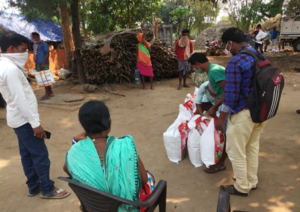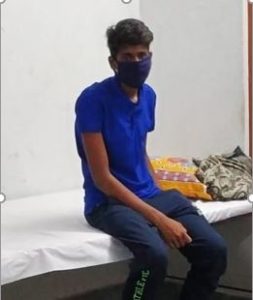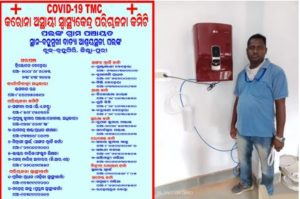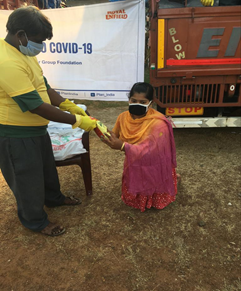Heroic Efforts of Corona Fighter ‘Kailash’
While the sudden outbreak of Corona has made the world suffer in many ways, Odisha is no exception to this. The pandemic, in particular, has made the lower strata of the society the most vulnerable. The poor people’s food security is completely in haywire.
 In Koraput district, Kailash Patra, a 30 years young Community Resource Person, while delivering the relief materials (food items and other essential commodities) to the poor and distressed families of Kumbharguda village in Kundra block, jointly supported by CYSD & Ford Foundation, an old woman with tearful eyes and relief packet in hand told him,
In Koraput district, Kailash Patra, a 30 years young Community Resource Person, while delivering the relief materials (food items and other essential commodities) to the poor and distressed families of Kumbharguda village in Kundra block, jointly supported by CYSD & Ford Foundation, an old woman with tearful eyes and relief packet in hand told him,
“I have received 3 months’ advance pension amount at a time supported by the Government under old age pension scheme, but I am finding no way to purchase the food items from the local market or haat for survival. But, because of you, I could receive the much needed immediate support at my door step. God bless you, my son.”
In mid of April when CYSD decided to distribute some survival kits to the most vulnerable and socio-economically poor families in 2 gram panchayats of Kundra block where there exist 20 hamlets including revenue villages with 8000 households, it was too difficult and challenging to identify about 100 such poor families with limited physical presence of staff members.
At this critical situation, Kailash from Jantaput village of Massigaon Panchayat of Kundra block came forward in close association with the concerned two Panchayat functionaries, Anganwadi Workers (AWW) and ASHA members and worked hard in finalizing the beneficiaries list, venue and date of distribution in the presence of PRI members.
“Since the outbreak of Corona, with the support and guidance of CYSD team members, I have been closely involved in the community and organizing number of awareness campaigns and sensitizing people through demonstration to practice handwash frequently, maintain social (physical) distancing in public places, like PDS distribution centre, water fetching points, MGNREGA work sites, community kitchen centres, farm fields, etc and staying at home more often, catching up with friends virtually instead of in person”, says proud Kaliash.
Kailash, having matriculation education, was associated with CYSD as an education volunteer initially for 3 years. And later since 2005 he has been involved as the Community Resource Person (CRP) in the intervention of Integrated Farming System (IFS) programme of the organization.
The heroic efforts put by hundreds of community resource persons, like Kailash in fighting Corona outbreak at the ground is praiseworthy.

 Rajendra Muduli, being a sponsored child under Child Development Programme of CYSD (Case No.323) was in regular touch. He lives with his mother Basanti, two younger brothers and a sister. His father passed way a few years back, who was the only bread earner for the family. Being the elder one, Rajendra was forced to shoulder the family responsibility along with the widow mother. Despite the hardship, he studied up to Matriculation (10th Standard). Out of his little understanding, he poised courage to take the responsibility of his father leaving his study career halfway and got prepared to feed the five-member family at the cost of his tender physical labour on daily basis. He was quite happy being engaged in household agricultural work along with causal daily wage earning.
Rajendra Muduli, being a sponsored child under Child Development Programme of CYSD (Case No.323) was in regular touch. He lives with his mother Basanti, two younger brothers and a sister. His father passed way a few years back, who was the only bread earner for the family. Being the elder one, Rajendra was forced to shoulder the family responsibility along with the widow mother. Despite the hardship, he studied up to Matriculation (10th Standard). Out of his little understanding, he poised courage to take the responsibility of his father leaving his study career halfway and got prepared to feed the five-member family at the cost of his tender physical labour on daily basis. He was quite happy being engaged in household agricultural work along with causal daily wage earning. Asraf’s father Jainul Uddin is a petty fish vendor at Brahmagiri daily bazar. Elder brother being an auto-rickshaw chauffeur used to carry the children to school and earns a minimal monthly remuneration. The yearly livelihoods of six-member family – parents, a brother and two sisters somehow gets managed. Last year, with much difficulty, before FANI, her elder sister could get marry. “The economic plight prompted me to supplement the family’s income in a dignified manner and destiny fetched him to join in a hotel at Palampally Nagar of Kochi, Kerala, only 3 months back travelling all the way from Odisha”, shared Asraf to CYSD’s field volunteer placed in Brahmagiri.
Asraf’s father Jainul Uddin is a petty fish vendor at Brahmagiri daily bazar. Elder brother being an auto-rickshaw chauffeur used to carry the children to school and earns a minimal monthly remuneration. The yearly livelihoods of six-member family – parents, a brother and two sisters somehow gets managed. Last year, with much difficulty, before FANI, her elder sister could get marry. “The economic plight prompted me to supplement the family’s income in a dignified manner and destiny fetched him to join in a hotel at Palampally Nagar of Kochi, Kerala, only 3 months back travelling all the way from Odisha”, shared Asraf to CYSD’s field volunteer placed in Brahmagiri. “Today is the 6th day of Asraf Uddin’s quarantine. He will continue to stay till 21 days at this quarantine centre. He is availing all facilities provided by the Govt. Two more returnees namely, Sukant Swain, an ex-serviceman who was stuck while returning home just after taking retirement from service; and Sk Ramjan Khadim from Hyderabad have also joined the Centre. A total of 90 migrant returnees have registered to stay at this centre. We are taking all possible precautionary measures for the safety of all inmates. Work distributions have also been made among the staff members”, said Trilochan Behera, the Sarapancha and TMC In-charge of Palank Gram Panchayat.
“Today is the 6th day of Asraf Uddin’s quarantine. He will continue to stay till 21 days at this quarantine centre. He is availing all facilities provided by the Govt. Two more returnees namely, Sukant Swain, an ex-serviceman who was stuck while returning home just after taking retirement from service; and Sk Ramjan Khadim from Hyderabad have also joined the Centre. A total of 90 migrant returnees have registered to stay at this centre. We are taking all possible precautionary measures for the safety of all inmates. Work distributions have also been made among the staff members”, said Trilochan Behera, the Sarapancha and TMC In-charge of Palank Gram Panchayat. Tulasi, lives in Behera Sahi slum of Patharbandha under Bhubaneswar Municipal Corporation area with her parents and a brother of 19 years. Her father used to maintain the livelihood of a four-member family through goat rearing. While her mother does the household chores, Tulasi helps her father in feeding the goats, finding pasture land and collecting leaf throughout the day, rearing of goat being the only source of the family’s income.
Tulasi, lives in Behera Sahi slum of Patharbandha under Bhubaneswar Municipal Corporation area with her parents and a brother of 19 years. Her father used to maintain the livelihood of a four-member family through goat rearing. While her mother does the household chores, Tulasi helps her father in feeding the goats, finding pasture land and collecting leaf throughout the day, rearing of goat being the only source of the family’s income.